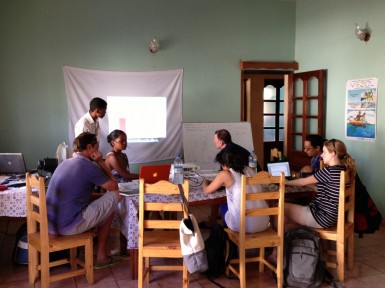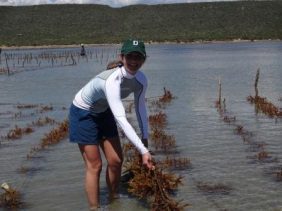In March, five students from the Tuck School of Business at Dartmouth came to Madagascar to work alongside Blue Ventures’ community-based aquaculture project as part of their First Year Project. These highly experienced business students came to Madagascar, and got to know the project from the inside out, through site visits, sea cucumber night monitoring, meetings with all relevant business partners, and detailed Q&A sessions about everything from supply chains to budgets to farmer association structure. Now, the students are back in the U.S. working on a business plan for the project, while keeping in close contact with us here in Madagascar. Read the students’ accounts of their trip, or read the original posts here, here and here.
By Avanti Maluste, Tuck 2014
After a great beach resort weekend (hey, it is spring break!), Team Blue Ventures was hard at work on Monday, making the most of our last few full days at the client site (Toliara, in Madagascar). On Monday, we met with the technician for Sarodrano to walk through his data collection gathering and aggregation process. Not surprisingly, given the villages served, this data is collected manually, inputted manually, and aggregated manually. This is a major concern for Blue Ventures as they plan on scaling the existing number of farmers as well as transfer responsibility of record keeping to the farmers and IOT (Indian Ocean Trepang, for-profit partner).
In the afternoon, we talked with Shawn Peabody, Blue Ventures’ country director for Madagascar. We discussed Blue Ventures’ role from a high level, making sure to understand the big picture of how this particular project fits into the mission.
Today, we met with the for-profit stakeholder in Blue Ventures’ supply chain: CopeFrito and their subsidiary, IOT. Blue Ventures currently serves as an intermediary for both seaweed and sea cucumber farming and their goal over the next three years is to transition existing farms to CopeFrito and IOT for those products respectively. From CopeFrito, we met with Ben Pascal and learned about his experience with transitioning villages from an NGO partner; it was critical to hear the challenges they faced during that time, and how they think about their data collection. From IOT, we met with Olivier Avalle to learn about how they are thinking about this transition – a real challenge given the dramatic increase in capacity (from 80k to 5M in a few years) and their lack of history with this kind of removal of the NGO from this process.
Tomorrow, we will meet with some of the local and regional microfinance institutions to learn about their role and their expectations for this transition. It will be our last full day in Toliara!



